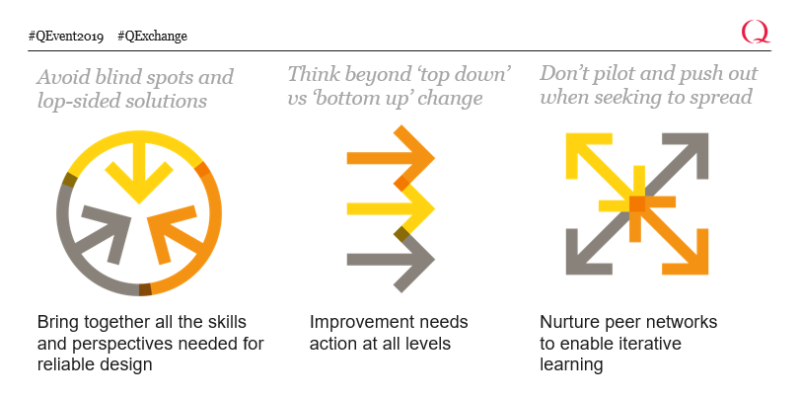At the UK-wide Q community event last week, I proposed three priorities for increasing the impact of the work we do individually and together to improve health and care: distilled from the work of the Health Foundation, our partners and what we’re hearing within Q.

In this blog, I say a bit more about what Q will be doing in each of these three areas over the months and years ahead.
 Bringing together all the skills and perspectives needed
Bringing together all the skills and perspectives needed
We need to be able to tap into a range of different skills and perspectives to understand and deliver even relatively straightforward change well. Especially when time and resources are tight, we can tend to over-rely on those people and techniques we have most readily to hand. But this can risk solutions being ‘lop-sided’, lacking the robustness or buy-in that will allow them to thrive long term.
We need a range of different skills and perspectives to understand and deliver even relatively straightforward change well
Q has already created thousands of connections between people from different parts of the health and care system, which our evaluation tells us are helping members get insights and ideas that help them in their work. Q Exchange and Q Lab are demonstrating on a larger scale the insight and energy that’s released when we pool ideas and expertise.
There’s more we can and will be doing through Q:
- We need to further develop the practical infrastructure that helps us find the expertise we need. Q’s digital infrastructure will be getting sustained investment. And two projects from the first round of Q Exchange are breaking new ground in this territory. Hexitime uses time banking principles to help people exchange skills. And there’s an improvement capability building maturity matrix in development that could provide a shared language and process for helping us find others who are further ahead in whatever we’re specifically looking to improve.
- Working well with people who bring different styles, expertise and perspectives can be hard. Indeed, if it’s not at least a bit challenging, you may well not have sufficient diversity in the room. Q is surfacing how rare it is for people to have the skills, space and support to give learning and collaboration the attention it deserves. The appetite for Liberating Structures within Q shows people recognise that the micro detail of how we work together matters. Q Lab, working with Nesta, are helping define and develop the capabilities that are needed for collaborative change: we’ll be launching a practical skills map in early 2020.
- Culture, history and power dynamics can mean some gaps are harder to bridge than others when it comes to pooling expertise. Q will be targeting recruitment at those working in areas likely to be particularly important to the change we need to deliver as a system: people in social care and those implementing new technology for example. And with National Voices and you, we’ll be looking to develop ways to convene and boost partnership with patients and service users involved in making care better.
 Aligning action at all levels in the system
Aligning action at all levels in the system
We now know that the organisational and system context we’re working in makes a big difference to the success of improvement efforts. And I think we’ve grown more confident in calling out the ways in which incentives, culture, budget choices and other factors can get in the way of the change we need to see at the frontline.
But moving from identifying the issue to creating a more aligned approach is hard. I see approaches to change that start centrally but feel disconnected from the mainstream reality of the services they are seeking to affect – sometimes getting stuck in structural shifts rather than being rooted in what will make a difference at the point of care or fizzling out once the central push and support moves on. And then other approaches that are bottom-up, generating huge enthusiasm but also struggling to embed long term. The Health Foundation’s work suggests that complex change typically needs action at all levels.
The Q community’s non-hierarchical ethos means that it’s rooted in the reality of achieving change in practice
Q brings together people with an understanding of improvement from all levels in the health and care system. Being funded and delivered in partnership with the organisations responsible for improvement in each part of the UK gives Q formal legitimacy. The Q community’s non-hierarchical ethos means that it’s rooted in the reality of achieving change in practice. Q can be a place to share and connect that cuts across the bureaucracy and politics that can get in the way of honest conversation and seeing the system as a whole. As a critical mass of Q members emerge in each area, we hope to see local systems make more of Q’s connections and infrastructure as a way of achieving their collective goals.
Next year, Q will be designing and launching a new offer targeted at those organisations leading change initiatives that span whole countries or regions. We want to make it easier for them to learn from each other and from what the community knows about what’s needed to enable improvement in practice. The aim is to respond to calls from members for Q to do more to influence the context within which improvement happens, helping together to make the most of the £bns that are invested in centrally led change initiatives. We’ll be developing ways to surface the ‘collective insight’ of the Q community – always seeking to do this in ways which help members learn and develop too.
 Nurturing peer networks to enable iterative learning and spread
Nurturing peer networks to enable iterative learning and spread
The implication of the two priorities above are that we need to invest more time in developing understanding of issues and potential solutions and in working out what this means at the frontline, organisation and system level. Given the urgency and scale of the challenges facing the health sector, and the pressure on resources, we have to get much better at ensuring that what we learn is reliably taken up everywhere that can benefit. We know that the ‘pilot and push out’ strategies that we often reach for now aren’t working reliably – because context is critical and successful change needs local buy-in, diagnosis and adaptation of ideas.
Q is helping in the following ways:
- Evidence suggests peer networks play an important role in developing and spreading innovation. Recent surveys of Health Foundation award holders and Q members suggest creating opportunities for learning from each other is a top priority for those implementing change. Crucially, networks provide the ongoing connections that people need: much better than a ‘static’ case study or conference presentation is someone you can exchange notes with as you travel along the often bumpy road of implementing change.
- The Q Lab is at the forefront of developing strategies for iteratively developing insights and supporting teams to test ideas that have benefitted from multiple perspectives. The Lab approach builds capability and confidence in parallel with developing ideas so that what’s produced has a greater chance of wider uptake. Looking forward, we’ll be offering a wider range of ways in which the Lab can support work on shared challenges in health and care, with exciting plans in the pipeline too for expanding the number of improvement labs – watch this space!
- Q Exchange, Q’s participatory funding programme, has been designed to encourage the wider uptake of promising ideas. Tapping into the wisdom of the community, 180 ideas were put forward as part of this year’s Q exchange round, with over 1200 comments shared as people supported each other to refine those ideas. By the time projects reach the final shortlist they have a group of supporters around them, who can help understand and help boost the work as it progresses, and offers ready-made conduits for spread when the time comes. We’ve now got funding to continue Q Exchange annually and will be sharing in the new year the plans for the next round!
The hope is that these alternative strategies for spread will lead to organic, but clearly seeded, examples of ideas growing faster, stronger and across a broader terrain
Over the years ahead, the hope is that these alternative strategies for spread will lead to organic, but clearly seeded, examples of ideas growing faster, stronger and across a broader terrain thanks to Q. And ultimately, we’ll see a culture and practice shift where it becomes more likely that people are both willing and able to find out what’s known and what others have done before implementing change.
Combining for greater collaborative impact
Taken together, action in these three areas could pave the way for a profoundly more collaborative approach to improvement. And that, in turn, could help us make much better use of the ideas, resources and passion that are so much in need to address the challenges facing health and care. It’s a long game, but with Q’s partners agreeing to a vision for 10 years further support for Q, together we’re on course for systemic – and exciting – change.
Next week, I’ll also be adding a list of a few of our top sources of evidence and inspiration for the three priorities in this blog. What links does this prompt for you? Please do share in the comments and I’ll pop them in – practising what we preach in terms of pooling what we know!
Comments
Tif 20 Nov 2022
It must make sense to repay this expense. Only you can attempt to return the money if something does not comply with the contract. But the most important thing is that flowers are not subject to such things. Because it indicates that you haven't taken a flight. I advise using a high-quality service as a result. Visit the website to see discount business class airfare how easily everything is handled for you.